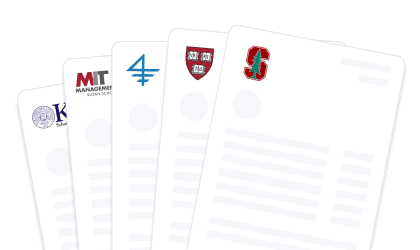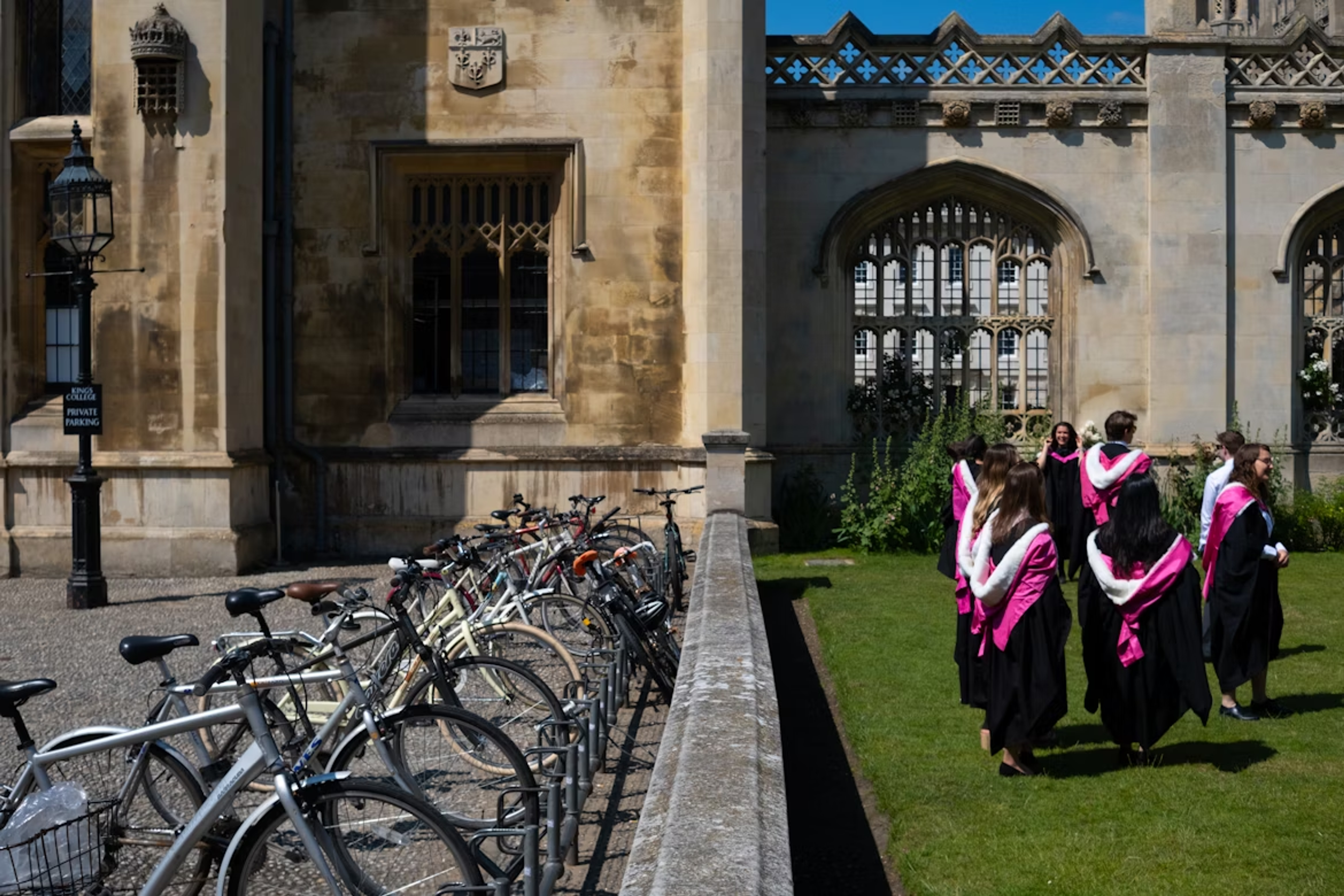An Expert Coach's Top Tips for Non-Traditional MBA Applicants
Join Coach Melanie E., and discover how to leverage your diverse experiences, career paths, and skill sets to craft a compelling application that showcases your true potential to business schools.

By Melanie E.
✍️ Essay Concierge |🚀 Ad Comm | 🎯200+ M7 Admits | 🎓 Columbia MBA Expert
Posted June 13, 2025

Join a free event
Learn from top coaches and industry experts in live, interactive sessions you can join for free.
Many non-traditional MBA applicants may feel bewildered by the MBA application process, but have no need to be nervous with the right guidance.
I was a successful non-traditional applicant when applying to M7 schools, ultimately attending Columbia Business School and receiving a coveted internship offer with consulting firm McKinsey. I had a fashion background and had spent many years becoming an expert on colors and fabrics, not go-to-market strategies or financial models.
Non-traditional applicants are typically considered those without a business-minded background, such as someone coming from an artistic industry like fashion, music, art, acting, etc. However, business schools seek out a diverse community, and so it is absolutely possible to turn what may seem like a weakness into a strength. These top tips will help you navigate the MBA application process successfully.
- Emphasize Transferable Skills: Highlight the skills, experiences, and/or networks from your non-traditional background that are relevant to the business world. Showcase how these transferable skills can contribute to your success in the MBA program and your specific short and long-term career goals. Utilize your resume, letters of recommendation, and essays to communicate these skills consistently.
- Upgrade Your Resume & LinkedIn: Update your resume to use business language. For example, managing bands on tour can be considered “stakeholder management.” Additionally, add explanations as needed, such as company descriptions or brief role descriptions to unique or lesser-known artistic jobs. Hyperlink to companies or projects as is relevant. The purpose is to give the admissions committee clear, digestible resume information. Lastly, ensure that you have a LinkedIn profile, and update the job titles, company names, and dates to exactly match your resume.
- Explain Your Motivation: Articulate your “why.” In other words, why you are pursuing an MBA, and how it aligns with your personal and professional aspirations. Your motivations are a way to set yourself apart in an informative, authentic, and compelling manner in your essays. Include (as is relevant) your “light bulb” moment when you realized your current career aspirations and plan to obtain an MBA.
- Why MBA: Clearly articulate how your transferable assets from point # 1 above will pair with the new skills, experiences, and/or networks you will gain in an MBA program in order to achieve your career goals. What is the existing + new = future success formula for you?
- Leverage Diversity: Emphasize the diversity of experiences, skills, and thoughts that you will bring to the MBA cohort. Your unique background can enrich classroom discussions and group projects, and top schools highly value diverse perspectives.
- Address Weaknesses Head-On: If you have any potential weaknesses in your application, such as lower test scores or limited business exposure, address them directly in the main essays and/or the optional essay. Be honest and reflective, showcasing your self-awareness and how you plan to work on your weaknesses and/or balance them with strengths.
- Showcase Your Extracurriculars: MBA programs value leadership, community involvement, and social know-how. It is important to showcase any relevant extracurriculars (during your undergraduate career as well as after), volunteering, hobbies, or leadership roles on your resume and the written application. These experiences that highlight working in teams, influencing, and/or helping others will improve your candidacy.
- Leverage Networking: Connect with current students or alumni at your target MBA programs who also have non-traditional backgrounds. Find them using LinkedIn searches and ask them how they showcased themselves in their applications. Networking can provide valuable insights and may help you establish additional rapport with the admissions committee.
- Showcase Adaptability: Consider demonstrating your ability to adapt and thrive, thus being able to manage a major career transition into the MBA program. Highlight situations where you successfully navigated change and uncertainty through letters of recommendation, your resume, and/or essays.
- Seek Professional Guidance: Consider working with an MBA admissions consultant who specializes in non-traditional candidates. They can provide valuable insights and help you present your best self in the application process.
Final Words
Remember, non-traditional MBA applicants often bring diverse and valuable perspectives to the table. Stay true to your unique journey and use these tips to make a strong case for your candidacy. Embrace your differences, demonstrate your potential, and show how an MBA will be the next step in your transformative career path.
Good luck with your application!
About the Author
Melanie is an Executive Coach & Admissions Coach with 16 years of experience across strategy, operations, and coaching. A former McKinsey consultant, she is a member of the Forbes Council and has been featured on NBC, ABC, CBS, Business Insider, TEDx, and more. Melanie has worked with prominent corporate clients including Google, KKR, IBM, and Morgan Stanley; as well as individuals such as business leaders, influencers, and Olympic athletes.
Melanie holds an MBA from Columbia University and a BS from Cornell University. She currently lives in Los Angeles (while remaining a New Yorker at heart), and enjoys creative pursuits in her free time.
Sign up for a FREE intro call with coach Melanie E. today, and jumpstart your path to your dream MBA program!

Written by Melanie
5.0
(69)
🚀As a Multi-Dimensional Coach, Melanie ties together the rigor of the executive world with the flow of the spiritual to transform your personal, professional, and academic life. Whether you’re looking to navigate the competitive MBA admissions process, enhance your leadership capabilities, or discover your life’s purpose, Melanie helps you unlock your full potential across all areas of your life. With over 18 years of experience (as of 2025), Melanie brings a powerful and unique blend of strategic business insight, coaching, and holistic healing arts to help you achieve your most ambitious goals. Her services include: 🌱 Life Coaching: Melanie empowers you to create meaningful change in your personal life by helping you overcome mental blocks, build confidence, and align with your true potential. Together, you will focus on self-discovery, mindset transformation, and purpose-driven living. ✨ Healing Arts: Through energy healing (Reiki), somatic coaching, tarot, and intuitive guidance, Melanie helps you clear mental and emotional blocks, align with your true purpose, and experience lasting transformation. 💼 Executive Coaching: Melanie utilizes her McKinsey toolkit and coaching methodologies to enable you to make powerful decisions, enhance your executive presence, and drive success. She is the author of the proprietary Espeland Method™ for executive presence. 🎓 MBA Admissions Coaching: As a Columbia MBA alumna and MBA Admissions Interviewer, Melanie has successfully helped 200+ applicants gain spots at top-tier schools like Columbia, Stanford, Harvard, and more. Together, you will craft a unique story that helps you stand out in the admissions process. ****** 📺Recognition: Melanie has been featured in Forbes, NBC, ABC, CBS, Business Insider, TEDx, and more. She has worked with prominent corporate clients including Google, Meta, IBM, and Morgan Stanley; as well as individuals such as business leaders, influencers, and Olympic athletes. ****** 👩🏻Biography: Melanie started her career working in fashion for several iconic brands including Diane Von Furstenberg, Alice + Olivia, and Elie Tahari. She later became a management consultant with McKinsey & Company where she advised F500 companies on strategy and operational improvement initiatives. Following her time at McKinsey, she was a Senior Lead in charge of Strategy and Innovation for Macy’s, the multi-billion omni-channel retailer. Melanie earned an MBA from Columbia University and a BS from Cornell University. She currently lives in Los Angeles and enjoys creative pursuits in her free time.
Melanie has helped clients get into organizations like:
Browse hundreds of expert coaches
Leland coaches have helped thousands of people achieve their goals. A dedicated mentor can make all the difference.

























